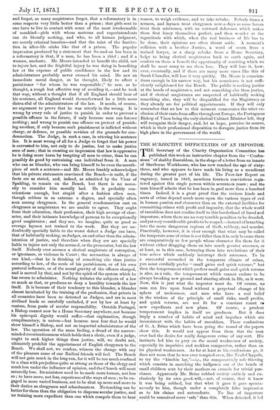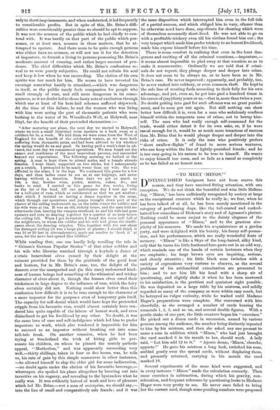published this week an instructive chapter from the "Confes- sions
"of shabby Rascaldom, in the shape of a letter from an inmate of Sherborne Workhouse, who has now reached the age of sixty- three, and who appears to have made his living as a mendicant during the greater part of his life. The Poor-law Report on vagrancy, issued in 1848, mentions fourteen convictions regis- tered against this single person within seventeen years ; and the man himself admits that he has been in gaol more than a hundred times. Indeed, it is a great proof that the various kinds and sorts of crime depend much more upon the various types of evil in human passion and character than on the external facilities for committing crimes with profit and impunity, that the whole world of rascaldom does not confine itself to this borderland of fraud and imposture, where there are no very terrible penalties to be dreaded, and yet very considerable profits to be reaped,—instead of launching into the more dangerous regions of theft, robbery, and murder. Practically, however, it is clear enough that what may be called the temperate zone of crime is not fuller than it is, only because there are comparatively so few people whose character fits them for it without either dragging them on into much greater excesses, or at least, as in this case, betraying them into revelations of their true selves which suddenly interrupt their successes. To be a successful scoundrel in the temperate climate of crime, you must cordially prefer "small gains and quick returns ;" but then the temperament which prefers small gains and quick returns is also, as i rule, the temperament which cannot endure to be always breaking new ground and starting afresh in life, as it were. Now, this is just what the impostor must do. Of course, no man can live upon fraud without a perpetual change of his sphere of uselessness, and men who have a real belief in the wisdom of the principle of small risks, small profits, and quick returns, are not fit for a constant resort to
new expedients and new plans. Of course, a prudent temperament implies in itself no goodness. But it does imply a number of habits of mind and impulses which are inconsistent with the habits of rascaldom. These confessions of G. A. Brine which have been going the round of the papers show this. It would not appear from them that the man ever had the desire for really dangerous crime of any sort. His instincts led him to prey on the moral weaknesses of society, especially its impulsive and reckless compassion, rather than on its physical weaknesses. As far at least as his confessions go, it does not seem that he was ever tempted even, like Noah Claypole, to try the " kinchin lay,"—i.e., the comparatively safe thieving which consists in snatching the halfpence out of the hands of small children sent by their mothers on errands for trivial pur- chases. Apparently Mr. Brine robbed society entirely and ex- clusively by its own good-will,—not, of course, that it knew it was being robbed, but that what it gave it gave sponta- neously to him, though under a completely false impression
as to his claims and antecedents. No line of imposture could be conceived more ' safe ' than this. When detected, it led only to short imp isonments, and when undetected, it led frequently to considerable profits. But in spite of this, Mr. Brine's diffi- culties were considerably greater than we should be apt to suppose. It was not the acumen of the public which he had chiefly to con- tend with. It was hardly on that part of the public which pos- sesses, or at least uses, acumen in these matters, that he at- tempted to operate. And there seem to be quite enough persons who either have no acumen, or will not use it for the detection of imposture, to furnish a living to persons possessing Mr. Brine's moderate amount of cunning, and rather larger amount of pru- dence. The chief difficulties which Mr. Brine's confessions re- veal to us were purely subjective. He could not refrain his soul and keep it low when he was succeeding. The elation of his own spirits was too much for him. He seems to have invested his earnings somewhat hastily in stimulant,—which was dangerous in itself, as the public rarely feels compassion for people who smell strongly of rum, and still more dangerous in its conse- quences, as it no doubt led to those hasty acts of exultation through which one at least of his best-laid schemes suffered shipwreck. At the time of this failure, he and the woman who was living with him were acting the part of rheumatic patients who were bathing in the water of St. Winnifred's Well, at Holywell, near Rhyl, for the benefit of their pretended rheumatism :-
"After maturing our plans, the next day we started to Holywell, where we took a small furnished room upstairs in a back room at a cobblers for 3s. a week. We told them we were come from the West of England for the benefit of the celebrated waters, as we were both suffering from rheumatic pains, and had been advised to try whether the spring would do us any good. So having paid a week's rent in ad- vance, the next day we commenced operations. We soon found out the names and residences of the most benevolent persons, and succeeded beyond our expectations. The following morning we bathed at the spring. A man is kept there to attend males, and a female attends females. I went there, supported on two sticks, but I subsequently got a crutch. I pretended to be much worse than ray wife. She was afflicted in the arms, I in the legs. We continued this game for a few days, and then ladies came to see us at our lodgings, and never leaving without a donation. Some days we got as much as 10s. a day, besides wine, porter, mutton, cakes, &c., and books to read. I carried on this gamo for five weeks, living on the fat of the land, till one unfortunate day I sent my wife for a half-pint of rum, which so exhilarated us that we got another; after which I insisted on having a dance together in the room, which through our operations and jumps brought down part of the ?Taster of the ceiling underneath us, on the table where the cobbler and his wife were at tea. It was an old, rickety house, and the man told me afterwards that, hearing the rumpus overhead, he and his wife had gone upstairs and seen us dancing together for a quarter of an hour before the ceiling fell. When I got downstairs I found the room half full of the neighbours, to whom the cobbler and his wife had given the intelli- gence about the dancing cripples. This, together with the row about the damaged ceiling (it was a large piece of plaster; I should think it was 16 or 20 feet in circumference), made me resolve to hook it' at once, for the news had spread like wildfire."
While reading that, one can hardly help recalling the tale in "Grimm's German Popular Stories" of that other cobbler and his wife who likewise watched through a keyhole a dance of entain benevolent elves caused by their delight at the raiment provided for them by the gratitude of the good host and hostess, for in Mr. Brine's case, too, the delight of the dancers over the unexpected and (in this case) undeserved kind- ness of human beings had something of the whimsical and tricksy character of elves about it, though the human elves owed their tricksiness in large degree to the influence of rum, which the fairy elves certainly did not. Nothing could show better than this confession how difficult it is to be true enough to the character of a mere impostor for the purposes even of temporary gain itself. The capacity for self-denial which would have kept the pretended cripple from his favourite rum, would almost certainly have ren- dered him quite capable of the labour of honest work, and even disinclined to get his livelihood by any other. No doubt, it was the same love of ease and self-indulgence which led him to prefer imposture to work, which also rendered it impossible for him to succeed as an impostor without breaking out into some tell-tale freak. On another occasion, when he had been trying at Sunderland the trick of hiring girls to per- sonate his children, on whom he pinned the mutely pathetic appeal, "Motherless," and was apparently succeeding very well,—thirty shillings, taken in four or five hours, was, he tells us, his rate of gain by this simple manceuvre in other instances, —he allowed himself to slap the elder girl for some indiscretion, —no doubt again under the elation of his favourite beverage,— whereupon she spoiled his plans altogether by bursting out into invective on his roguery, and revealing to the bystanders what he really was. It was evidently hatred of work and love of pleasure which led Mr. Brine,—not a man of enterprise, we should say,— into the line of small and comparatively safe frauds ; and it was the same disposition which interrupted him even in the full tide of a partial success, and which obliged him to vary, oftener than he otherwise need have done, expdients for cheating which were of themselves necessarily short-lived. He was not able to go on with a profitable trickery even till his victims found him out ; the very temper which made him prefer trickery to an honest livelihood, made him expose himself before his time.
There is some comfort in realising that even in the least dan- gerous and exciting of all the criminal vocations,—imposture,- it seems almost impossible to plod away at that vocation so as to make it remunerative. Ordinarily we are told that if crimi- nals do not repent, they plunge deeper and deeper into crime. It does not seem to be always so, or to have been so in Mr. Brine's case. He never improved ; apparently, and probably, too, he never rushed into robbery, or even common theft. He kept to the safe line of treating fools according to their folly for his own advantage, and yet, even so, he got into gaol a hundred times in his career of (say) forty years or so,—that is, more than twice a year. No doubt getting into gaol for such offences was no great punish- ment, and he soon got out again. But still nothing can show better how difficult it is, even for a man who sedulously confines himself within the temperate zone of crime, not to betray him- self. The man who had really enough self-command for the trade, would either detest it for its own sake, or, if he were rascal enough for it, would be so much more tenacious of success than Mr. Brine that he would plunge deeper and deeper into the risks of crime. It is only the man who positively prefers "short swallow-flights" of fraud to more serious ventures, who can keep within the line of lightly-punished frauds ; and he is too easy-going in his nature to be true to himself. He wants to enjoy himself too soon, and so fails as a rascal as completely as he has failed as an honest man.



































 Previous page
Previous page